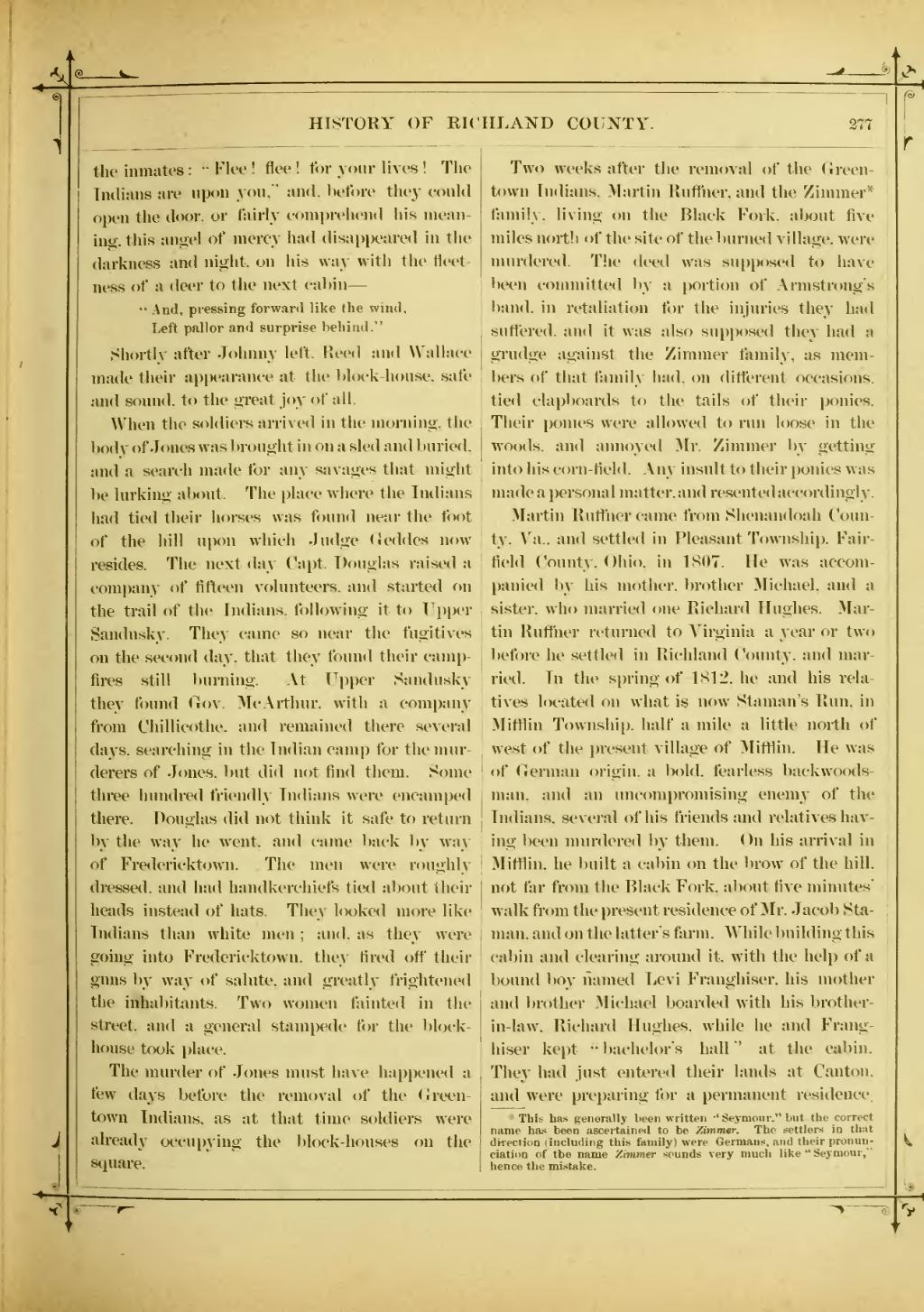^1
��HISTORY OF RICHLAND COUNTY.
��277
��the inmates: " Flee! flee! for 3'Oiir lives! The Indians are upon you." and. before the}' could open the door, or fairly e(jmpreliend his mean- ino-, this angel of mercy had disappeared in the darkness and night, on liis way with the fleet- ness of a deer to the next cabin —
•• And, pressing forward like the wind, Left pallor and surprise heliind."
Siiortly after Jolniny left. Heed ami Wallace made their appearance at tiic block-house, safe and sound, to the great joy of all.
When the soldiers arrived in the morning, the V»(xly of Jones was brought in on a sled and buried, and a search made for any savages that might be lurking about. The place where the Indians had tied their horses was found near the foot of the hill upon which Judge (reddes now resides. The next day Capt. Douglas raised a company of fifteen volunteers, and started on the trail of the Indians, following it to Upper Sandusky. They came so near the fugitives on the second day. that they found their camp- fires still l)urning. At Upper Sandusky they found Gov. McArthur. with a company ft'om Chillicothe. and remained there several da^'S. searching in the Indian camp for the mur- derers of Jones, Init did not find them. Some three hundred friendly Indians were encamped there. Douglas did not thinlv it safe to return by the way he went, and came liack liy way of Fredericktown. The men were roughly dressed, and had handkerchiefs tied about their heads instead of hats. They looked more like Indians than white men: and, as they were going into Fredericktown. they fired off their guns l)y way of salute, and greatly frightened the inhaljitants. Two women fainted in the street, and a general stampede for the block- house took place.
The murder of Jones must have happened a few days before the removal of the Green- town Indians, as at that time soldiers were already occupying the block-houses on the square.
��Two weeks after the removal of the Green- town Indians, Martin Ruffner, and the Zimmer* family, living on the Black Fork, about five miles north of the site of the burned village, were murdered. The deed was supposed to ha^'e been committed ])v a portion of Armstrongs band, in retaliation for the injuries they had suflered. and it was also supposed they had a grudge against the Zimmer family, as mem- bers of that family had, on different occasions, tied clapboards to the tails of their ponies. Their pomes were allowed to run loose in the woods, and annoyed Mr. Zimmer by getting into his corn-field. Any insult to their ponies was made a personal matter, and resentedaccordingiy .
Martin Rufther came from Shenandoah Coun- ty, Va.. and settled in Pleasant Township, Fair- field County. Oliio. in 1807. He was accom- panied by his mother, brother Micliael, and a sister, who married one Richard Hughes. Mar- tin Ruffner returned to Vii-ginia a year or two before he settled in Richland County, and mar- ried. In the spring of 1812, he and his rela- tives located on what is now Staman's Run, in Mifflin Township, half a mile a little north of west of the present village of ^Mifflin. He was of German origin, a bold, fearless backwoods- man, and an uncompromising enemy of the Indians, several of his friends and relatives hav- ing been murdered by them. On his aiTival in Mifflin, he built a cabin on the brow of the hill, not far from the Black Fork, about five minutes" walk from the present residence of ^Ir. Jacob Sta- raan. and on the latter's farm. While building this caliin and clearing ai'ound it, with the help of a bound boy named Levi Franghiser, his mother and brother ^Michael boarded with his brother- in-law. Richard Hughes, while he and Frang- hiser kept •■ liachelors hall "' at the caliin. They had just entered their lands at Canton, and wei-e preparing for a permanent residence.
- This has generally been written •'Seymour." but the correct
name has been ascertained to be Zimmgr. The settlers in that direction (including this family) were Germans, and their pronun- ciation of the name Zimmer sounds very much like " Seymour," hence the mistake.
�� �
